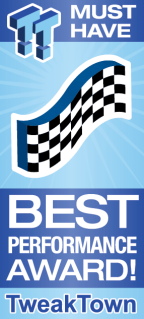
The Bottom Line
Introduction
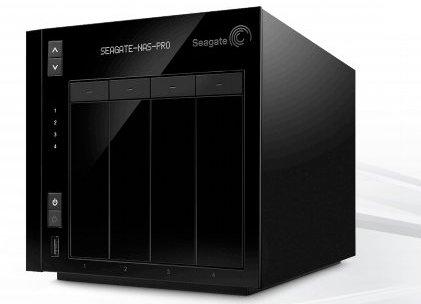
Since finalizing the acquisition of LaCie, Seagate has released several new client and SMB network storage systems to the market. The company's innovative eight-drive design that fits in a 1U space really started it off.
Today we're looking at Seagate's latest design for the small business market, a model designed for 25 to 50 users, the NAS Pro.
Hardware Specifications and Pricing
Modern NAS servers have moved beyond data storage through a wire network. In order to get the most out of a NAS, you need to look at the extra I/O hardware, and the mountain of potential software features.
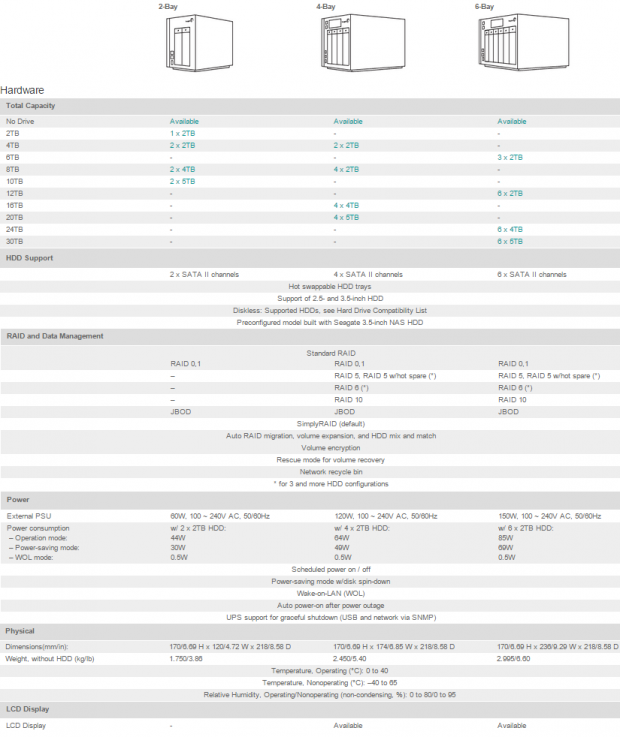
Seagate released the NAS and NAS Pro on the same day. The NAS is a consumer / entry-level SMB product that shares the same chassis as the NAS Pro, but the similarities end there. The NAS Pro ships in three versions, 2-Bay, 4-Bay, and 6-Bay designs. From there, each unit branches into a number of SKUs based on disk configuration, and total capacity. The unit we're testing today has four-drive bays, each filled with Seagate NAS 4TB HDDs, totaling 16TB of raw storage capacity.
The NAS Pro 4-Bay unit supports RAID 0, 1, 5, 6, and 10, and JBOD. The NAS Pro 4-Bay unit ships in SimplyRAID, Seagate's simple to configure, anyone in the office can do it, redundant configuration. That means you can use the NAS Pro right out of the box, with very little setup time involved.
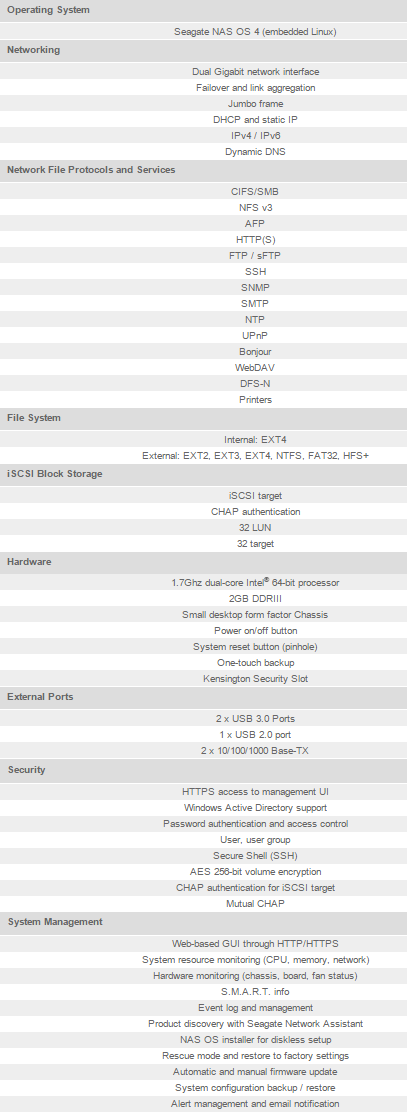
Deep in the heart of the NAS Pro is an Intel Dual-Core 1.7GHz C2000 Series processor, and 2GB of RAM. IO connectivity comes from two gigabit Ethernet, two USB 3.0, and one USB 2.0 port.
Prices range from $499.99 for the 4-Bay Diskless model to $1899.99 for the 20TB model filled with four 5TB Seagate NAS HDDs. The system we're testing today uses four 4TB Seagate NAS HDDs for a total of 16TB, and costs $1299.99 at the time of writing. Seagate covers the NAS Pro product line with a three-year warranty.
PRICING: You can find the Seagate NAS Pro 4-Bay for sale below. The prices listed are valid at the time of writing, but can change at any time. Click the link to see the very latest pricing for the best deal.
United States: The NAS Pro 4-Bay (Diskless) retails for $499.99 at Amazon, the NAS Pro 4-Bay (8TB) retails for $779.52 at Amazon, the NAS Pro 4-Bay (16TB) retails for $1,299.99 at Amazon, and the NAS Pro 4-Bay (20TB) retails for $1,899.99 at Amazon.
Software Features
NAS products are equal parts hardware performance, and software features. One compliments the other in a balanced product. You need more hardware performance to run more software features at the same time.
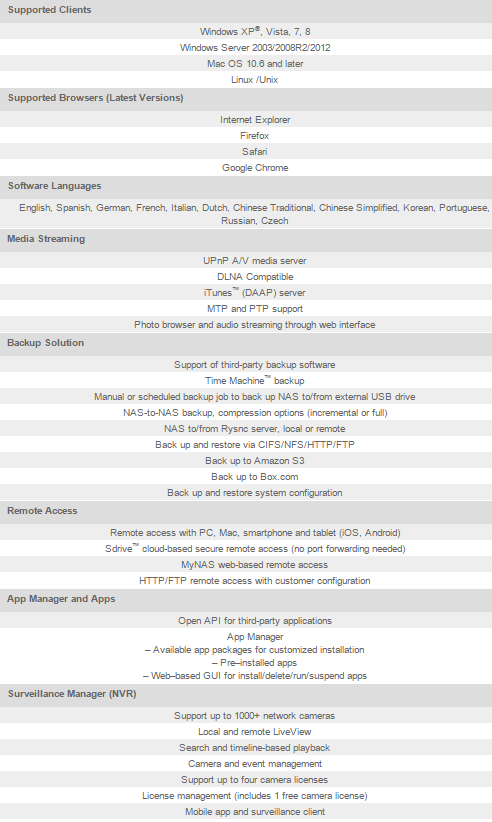
The Seagate NAS Pro provides a plethora of SMB, and even consumer services in the system's built-in software.

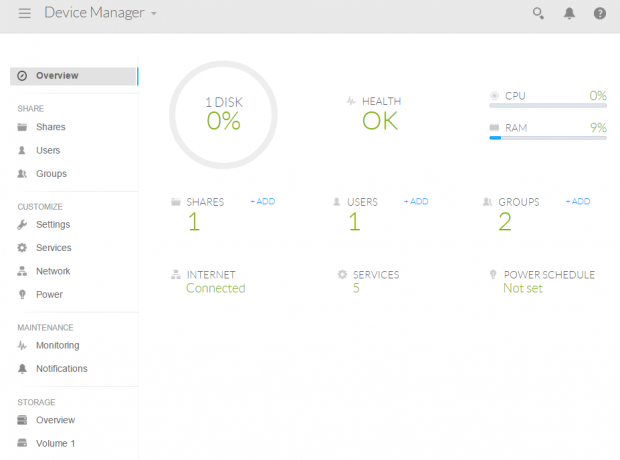
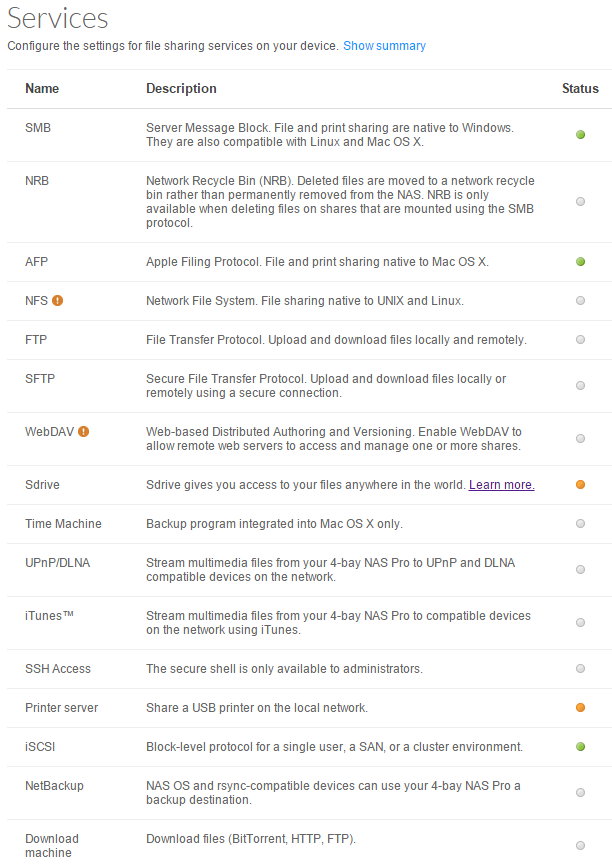
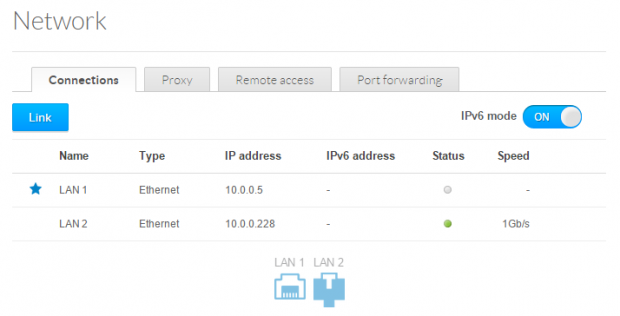
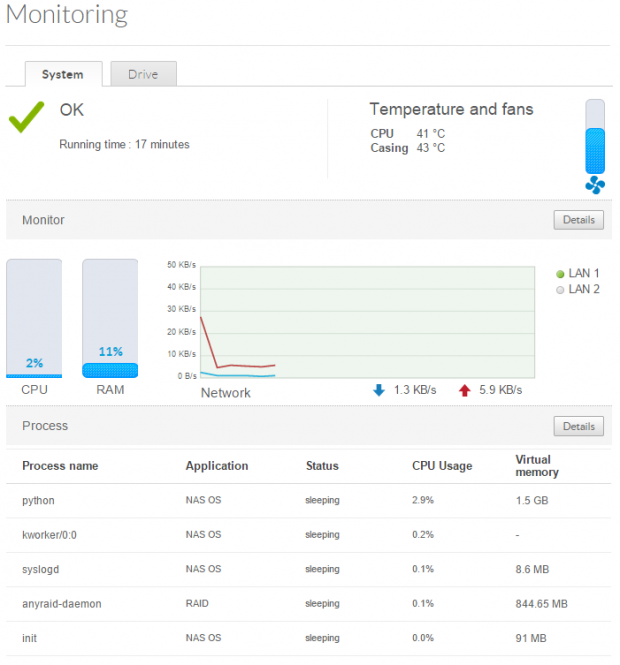
Packaging and Accessories
Packaging
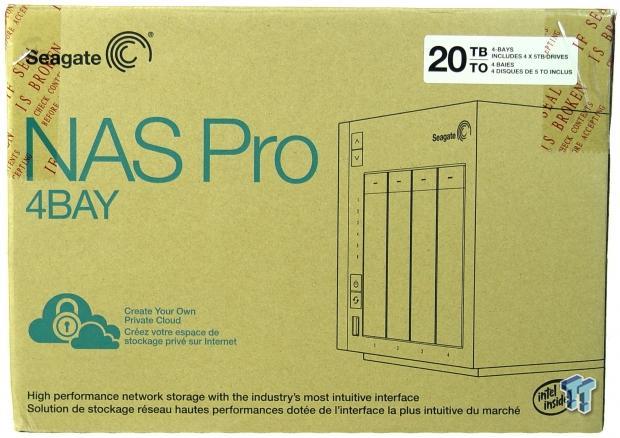
Our system actually shipped in a 20TB (5TB x 4) box according to the sticker on the package.
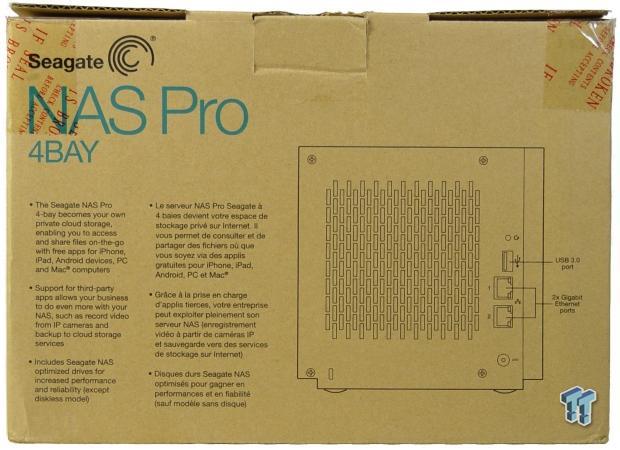
We found everything packed well inside with the accessories, power supply, and cables in a separate inner box.
Accessories
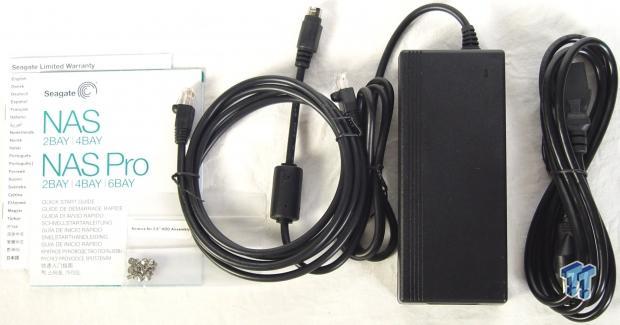
The NAS Pro ships with an external power supply, Ethernet cable, and screws for attaching 2.5" drives in the system.
Seagate NAS Pro 4-Bay
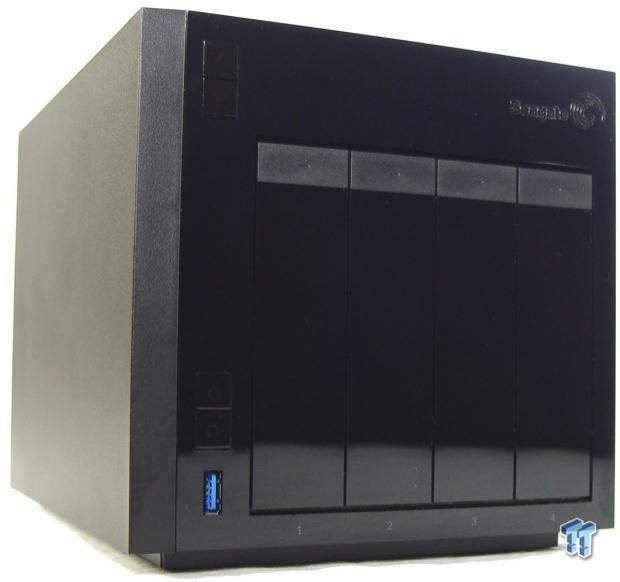
The Seagate NAS Pro has an attractive face that is finished in piano black. The four non-locking drive bays allow users to quickly and easily add, or replace disk in a moments notice.
A USB 3.0 port on the front of the system offers one touch backup when used in conjunction with the backup button just below the power button.
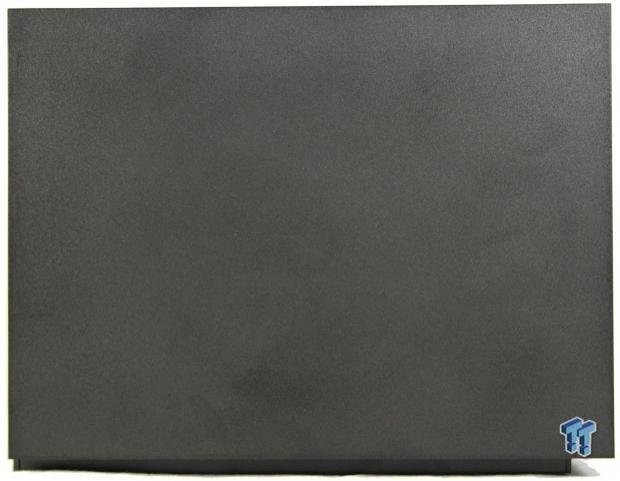
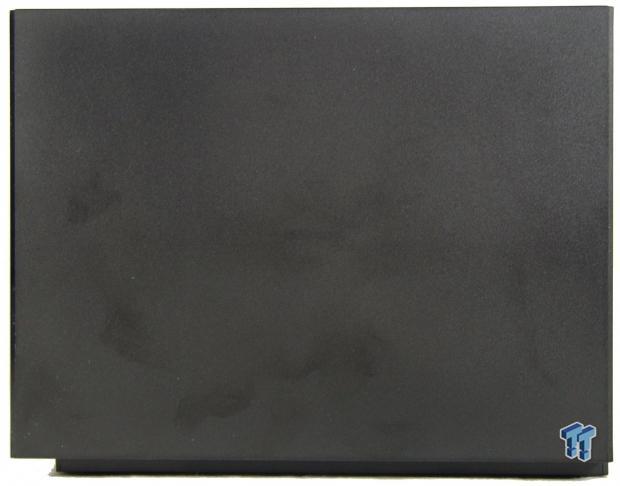
Both sides of the NAS are sealed, so the air moved by the rear fan enters the system through the small openings in the front of the NAS.
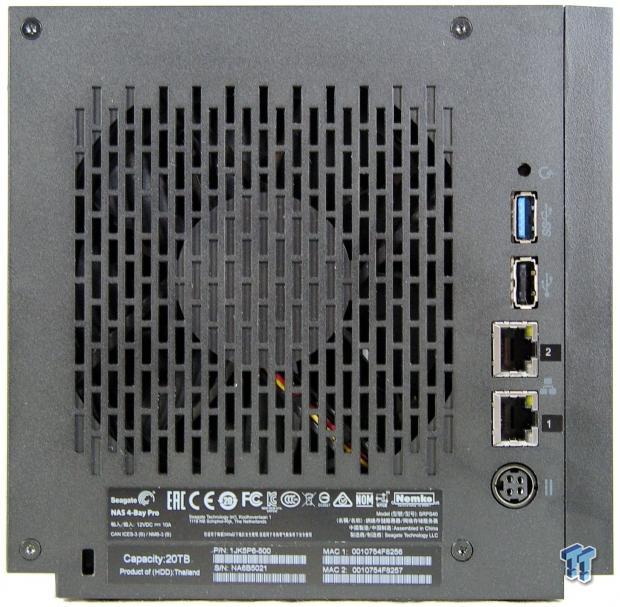
The system uses a large fan to reduce vibration and noise. A Kensington lock adapter on the bottom left side keeps the NAS Pro safe when anchored.
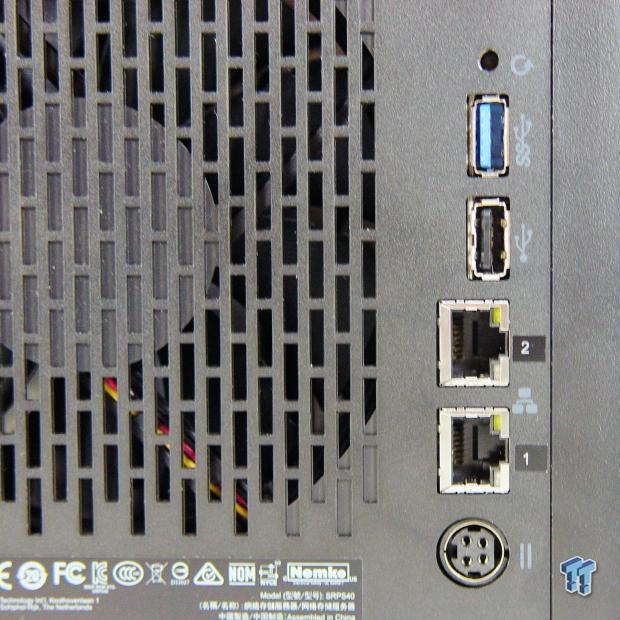
IO comes from two gigabit Ethernet ports that can be used independently for use on two networks, or teamed for increased throughput to a single network. The two USB ports on the back, one 2.0 and one 3.0, add expansion options to the system.
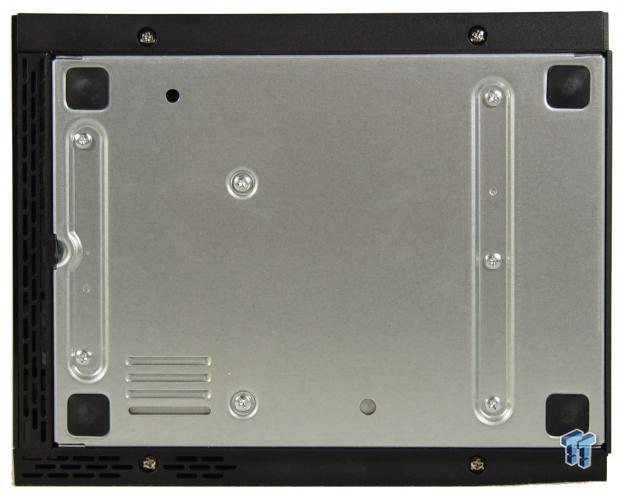
Four soft rubber feet on the bottom reduce vibration to the table top.
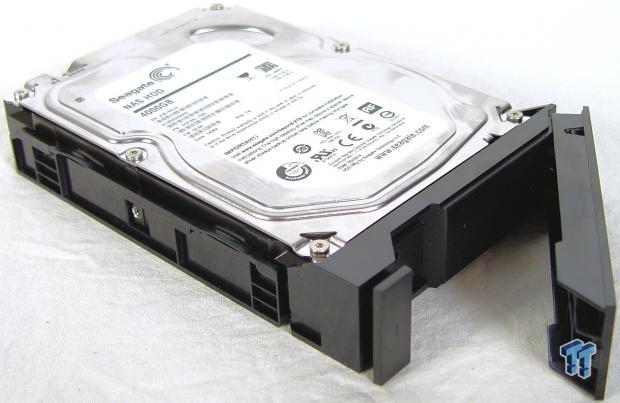
With 3.5" drives, the sleds are tool-less. Seagate includes screws if you want to run 2.5" drives. The Seagate NAS Pro systems purchased with disks ship with Seagate NAS HDDs.
Test System Setup
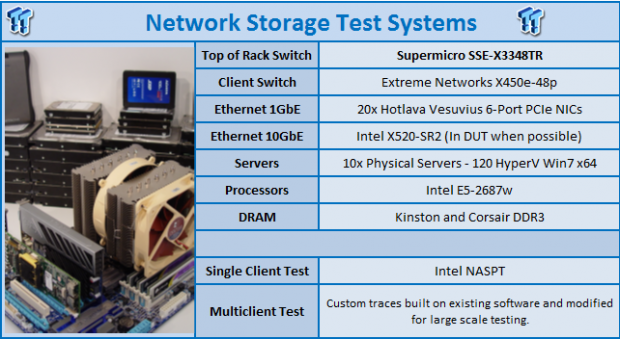
Our NAS test 'system' has migrated to three 42U racks, similar to what you'd find in a datacenter. There are ten servers that attack the target NAS with 120 Hyper-V installations of Windows 7 64-bit, each with a dedicated gigabit Ethernet port. The systems feed to three Extreme Networks X450e-48p switches, and then to a Supermicro SSE-X3348TR top-of-rack switch. The device being tested connects to the Supermicro switch via 1GbE, 10GbE, or 40GbE. The iSCSI and NASPT tests use a single machine connected to the Supermicro switch.
This level of testing wouldn't be possible without the help and support from several companies, many of which have little to do with NAS products. We would like to thank AVADirect, Antec, Corsair, GIGABYTE, Icy Dock, Kingston, LSI, Noctua, Rosewill, Seagate, Thermaltake, and Western Digital for their much-appreciated support.
Intel NASPT
The Intel NAS Performance Toolkit (NASPT) is a file system exerciser and analysis tool designed to enable direct measurement of home network attached storage (NAS) performance. NASPT is designed to emulate the behavior of an actual application, and uses a set of real-world workload traces gathered from typical digital home applications. Traces of high definition video playback and recording, office productivity applications, video rendering/content creation, and more, provide a broad range of application behaviors.
TweakTown Custom 120-Client Office Test
The TweakTown Custom 120-client Office Test uses 120 Windows 7 Hyper-V installations, and custom software to stress each NAS with traces from Microsoft Office tasks. Both throughput (in Mbits per second) and latency (in milliseconds) are measured.
Seagate NAS HDD
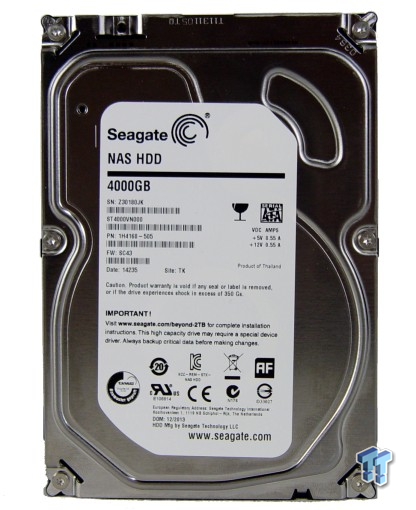
TweakTown uses Seagate NAS hard drives for all of our NAS tests. You can read our full review of the Seagate NAS HDD here.
Supermicro SSE-X3348TR 10GbE / 40GbE Switch

With a switching fabric of 1284 Gbps through forty-eight 10GBaseT and four 40GbE ports, the SSE-X3348TR is our switch of choice for testing SMB and enterprise network attached storage products. You can read our full review of the Supermicro X3348TR top of rack switch here.
Benchmarks - RAID 5 Single Client Performance
Benchmarks - RAID 5
RAID 5: Block-level striping with parity data distributed across all member disks.
HD Video Playback
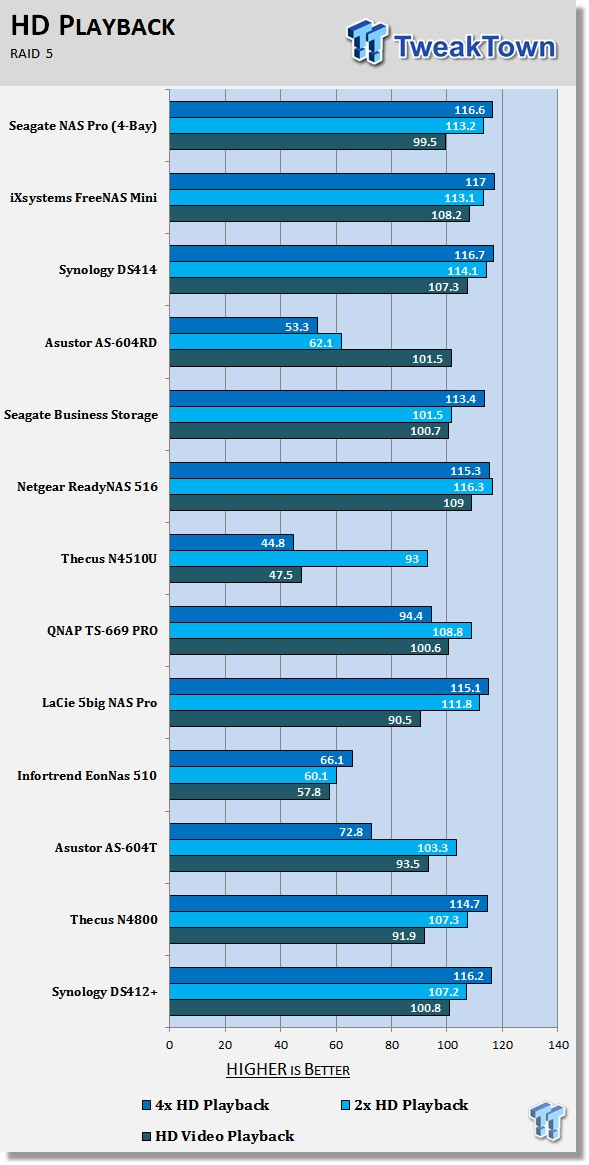
HD Video Play - 720p HD stream from Windows Media Player 256kB reads
2HD Video Play - 2x playback
4HD Video Play - 4x playback
HD Video Record
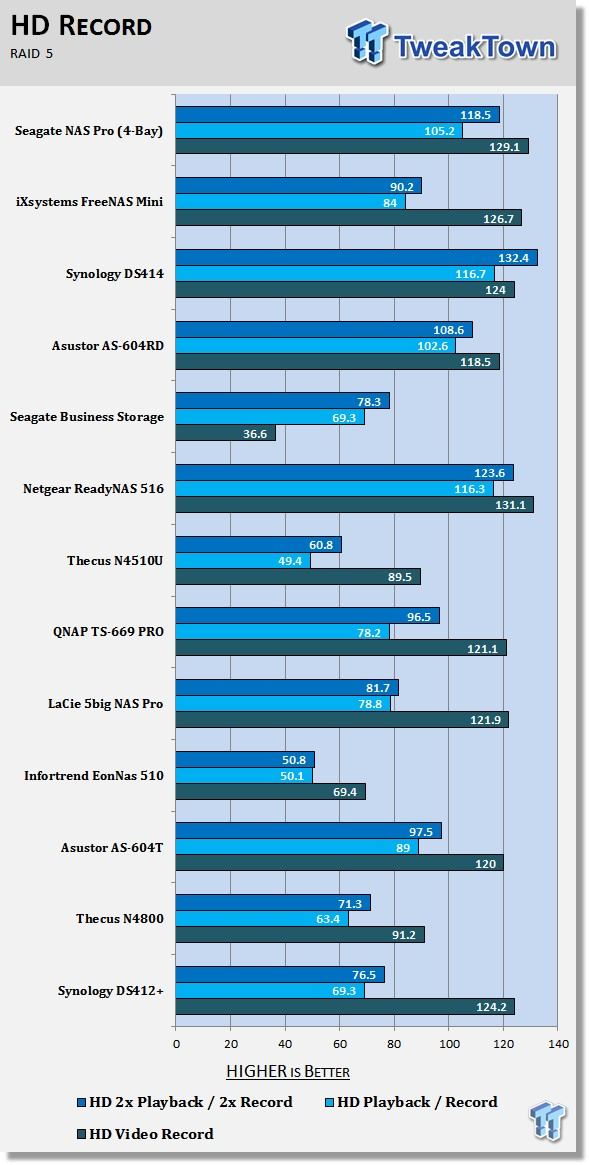
HD Video Record - 720p HD stream, 256kB writes
HD Video Play & Record - one playback, one record simultaneously
2x HD Video Play & 2x Record - two playback, two record simultaneously
Content Creation
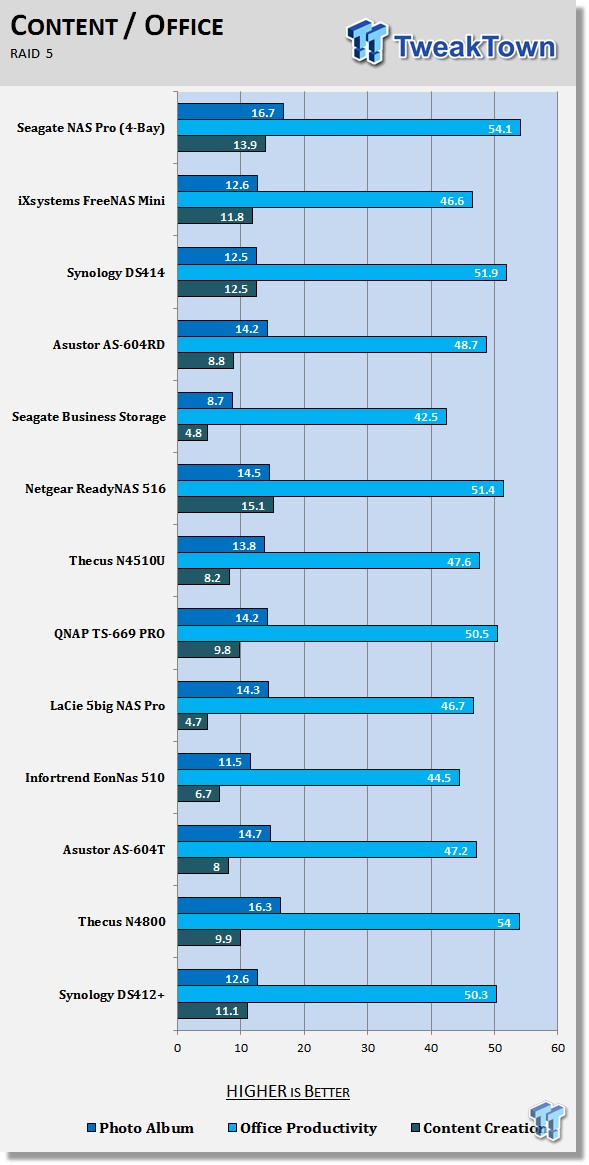
Photo Album - All reads - wide distribution of sizes
Office Productivity - Reads and writes; 1kB & 4kB reads, mostly 1kB writes
Content Creation - 95% writes; 1k, 4k & little reads; writes up to 64kB
File / Directory Transfer
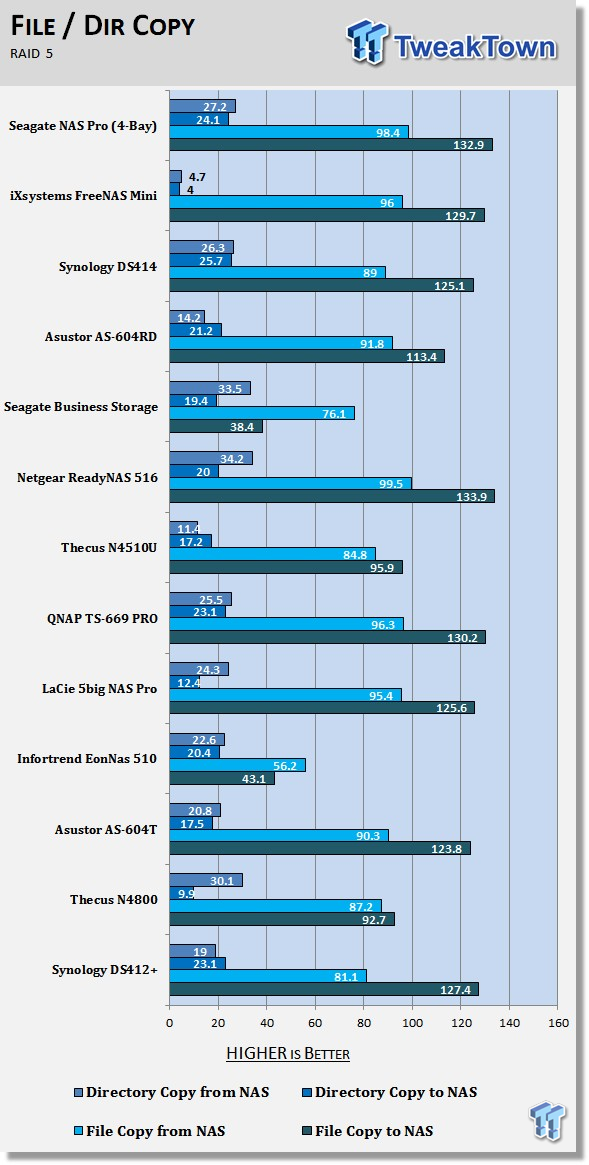
Directory Copy From NAS - 64kB reads
Directory Copy To NAS - Predominantly 64kB writes, wide scattering under 16kB
File Copy From NAS - 4GB file copy, 64kB reads
File Copy To NAS - 64kB writes
Single Client Performance Summary
In single client tests over SMB 2.0, the Seagate NAS Pro performs at or near the top in every test. In these workloads, we couldn't find a single test the NAS Pro was weak in.
Benchmarks - iSCSI Database and Workstation Workloads
Benchmarks - Database Workload
IOPS
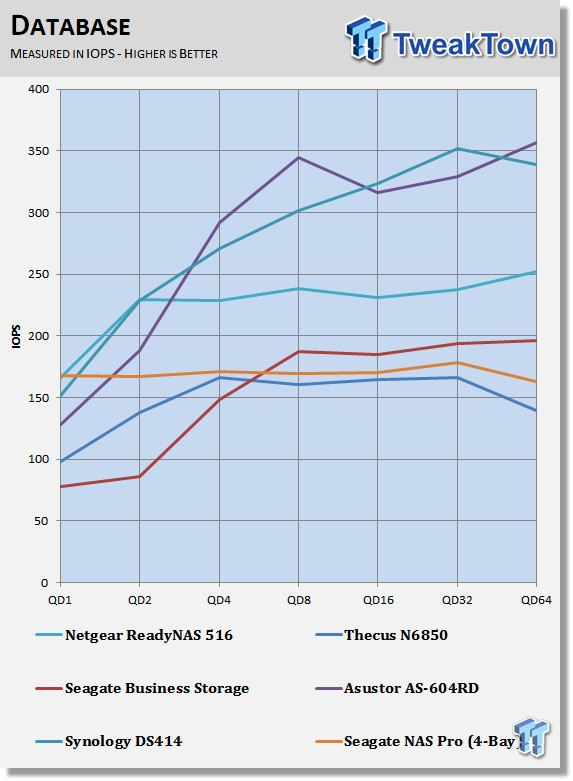
Latency
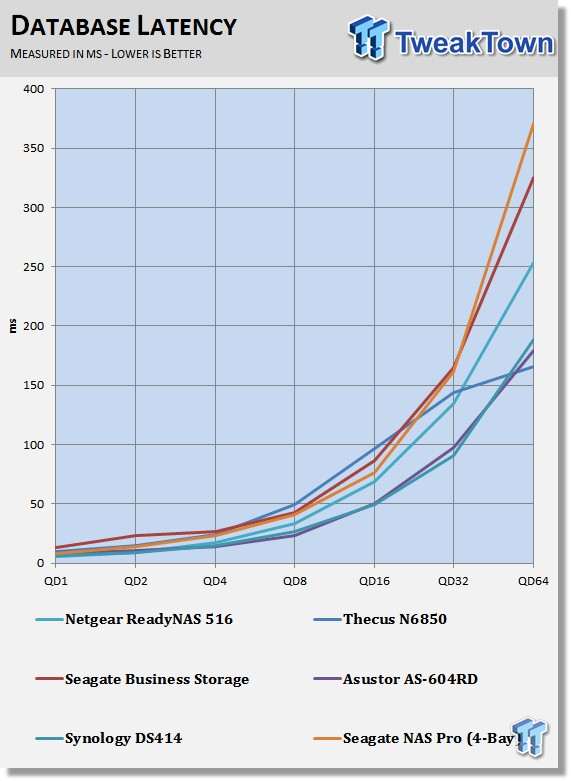
Outstanding IO
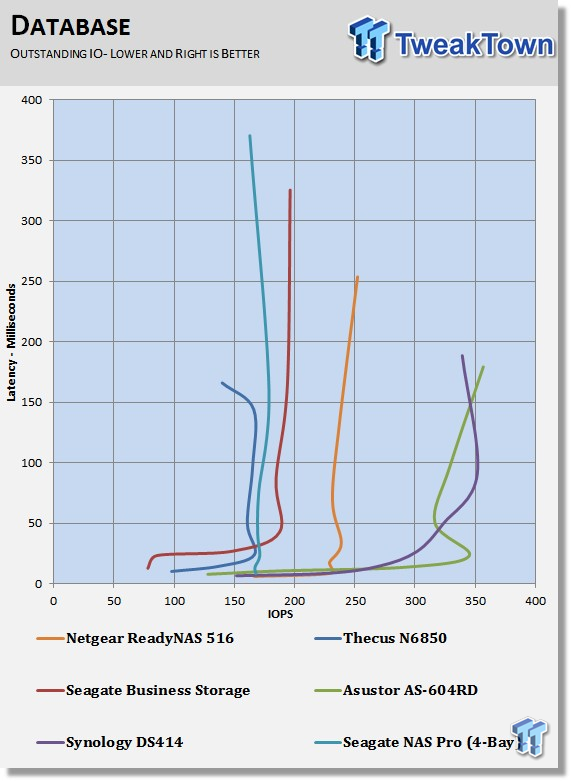
The Seagate NAS Pro 4-bay loaded with Seagate 4TB NAS HDDs delivers between 150 and 200 IOPS in our database test. The latency scales with increased queue depth, but the IOPS performance remains in a narrow band.
Benchmarks - Workstation Workload
IOPS
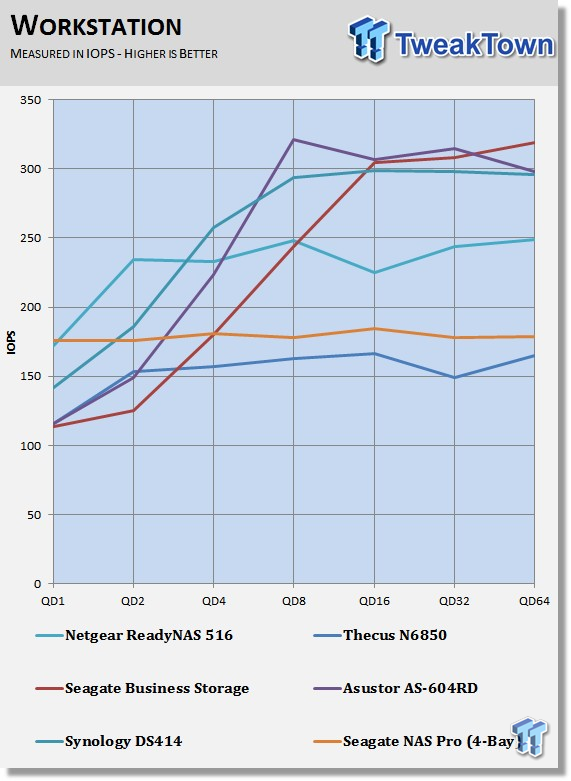
Latency
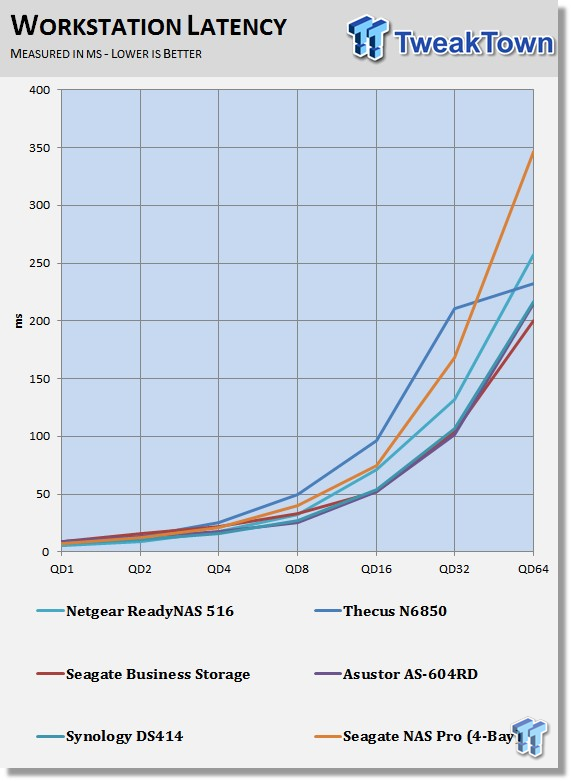
Outstanding IO
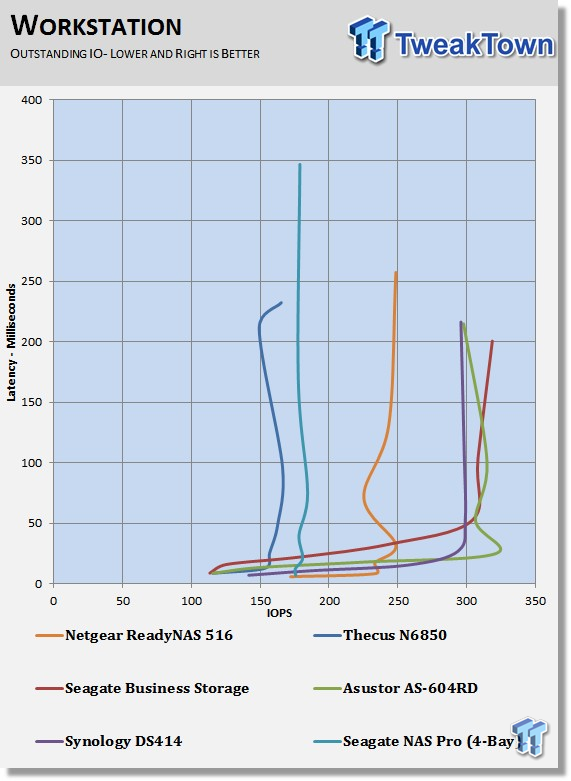
The workstation test shows nearly the same level of performance, and the same fixed IOPS performance, even though the load increases. The latency increases as the load shoots up.
Benchmarks - iSCSI Server Workloads
IOPS
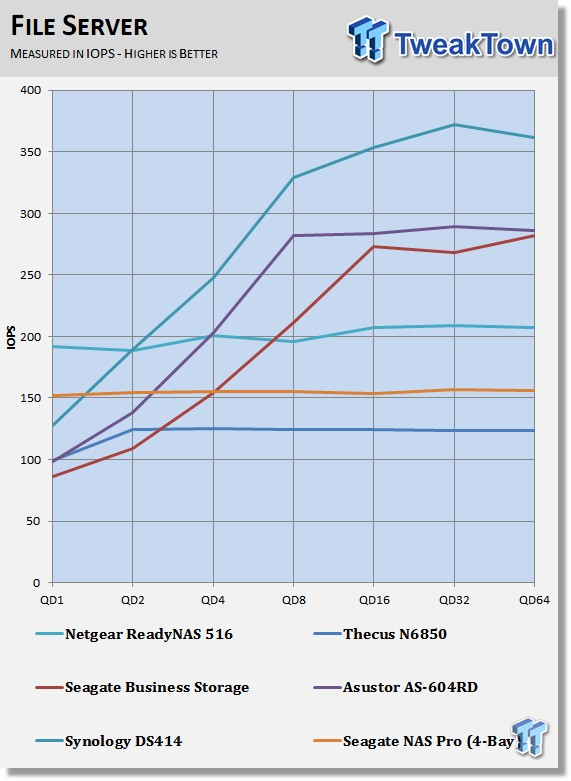
Latency
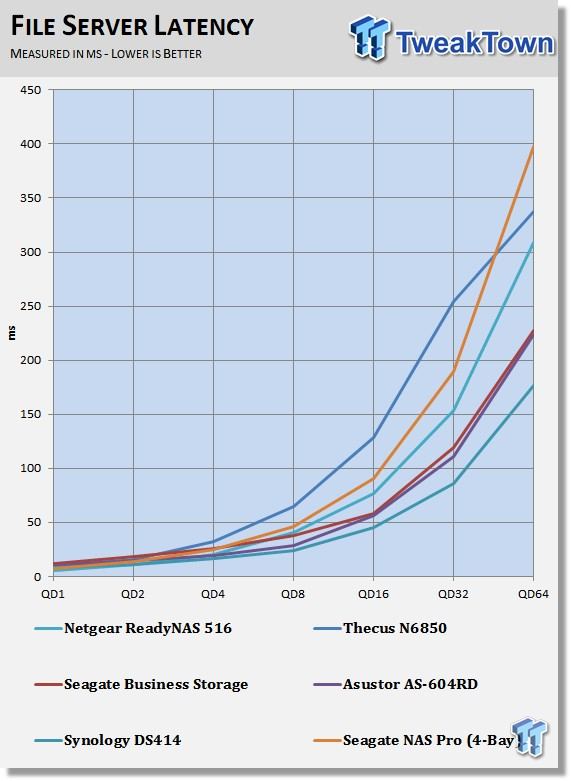
Outstanding IO
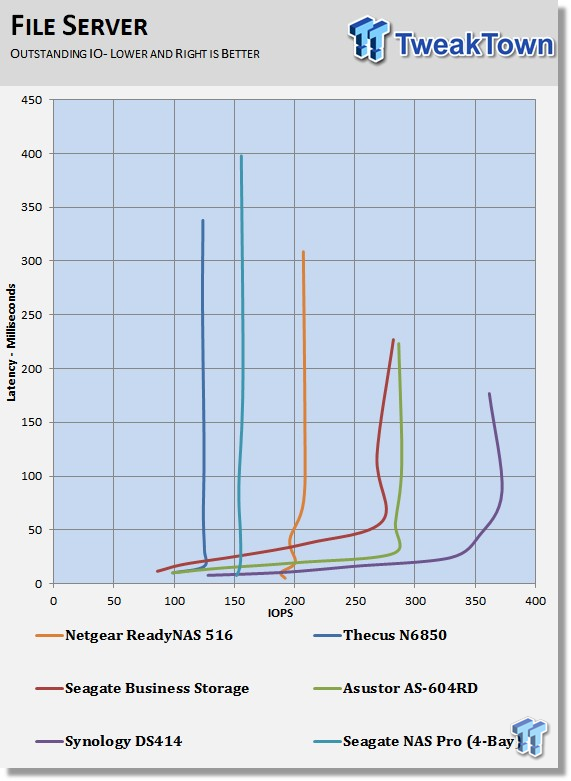
Again, we don't see a significant performance increase in performance when we increase the load. The Seagate NAS is good for over 200 IOPS in the file server test though, which is a step up from the other workloads so far.
Benchmarks - Email Server Workload
IOPS
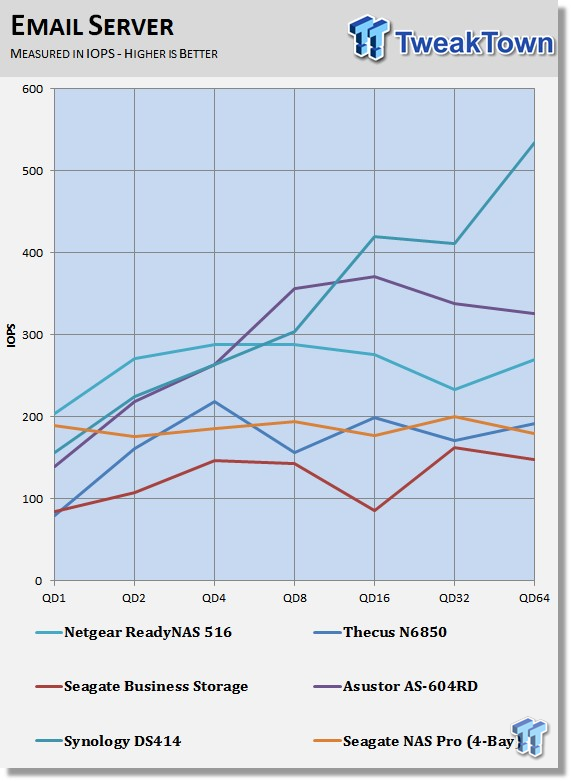
Latency
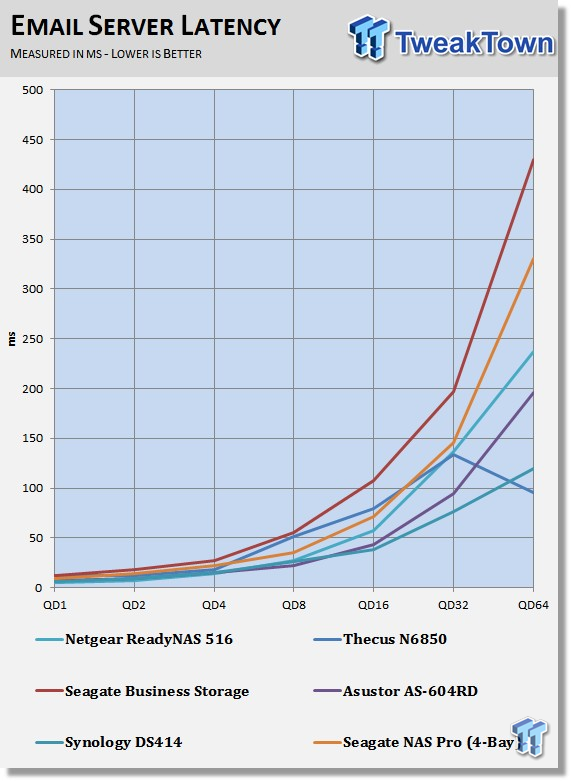
Outstanding IO
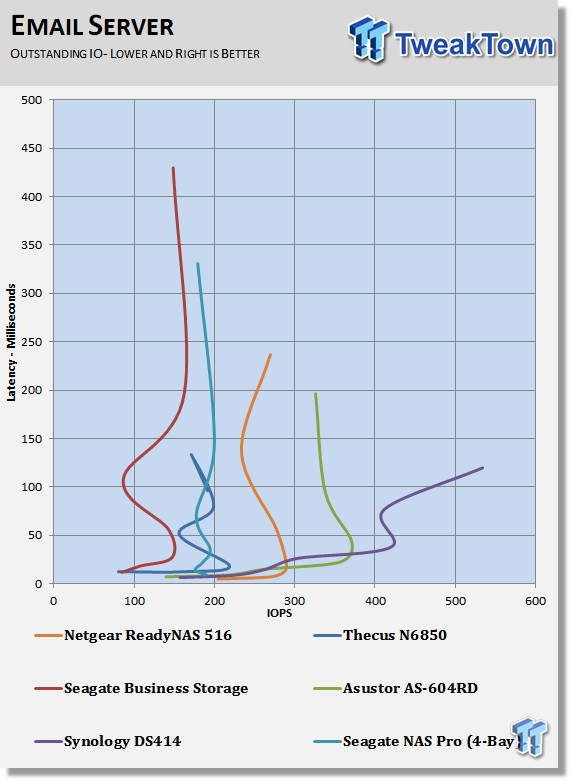
Under an email server workload, the Seagate NAS Pro recovered after heavy load, and was faster than most of the other products in the chart.
Benchmarks - Web Server Workload
IOPS
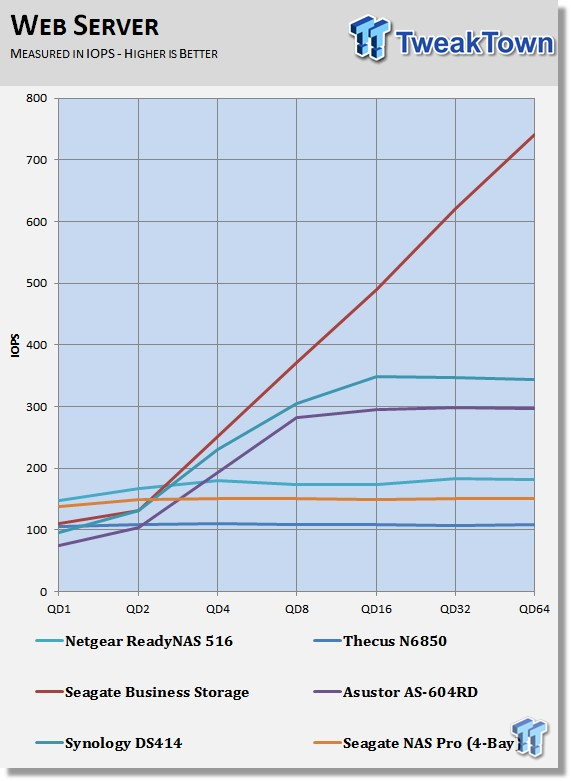
Latency
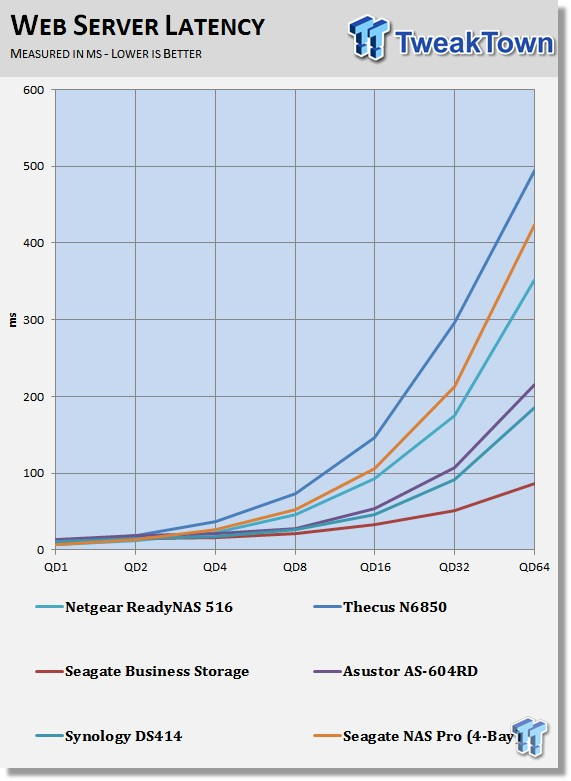
Outstanding IO
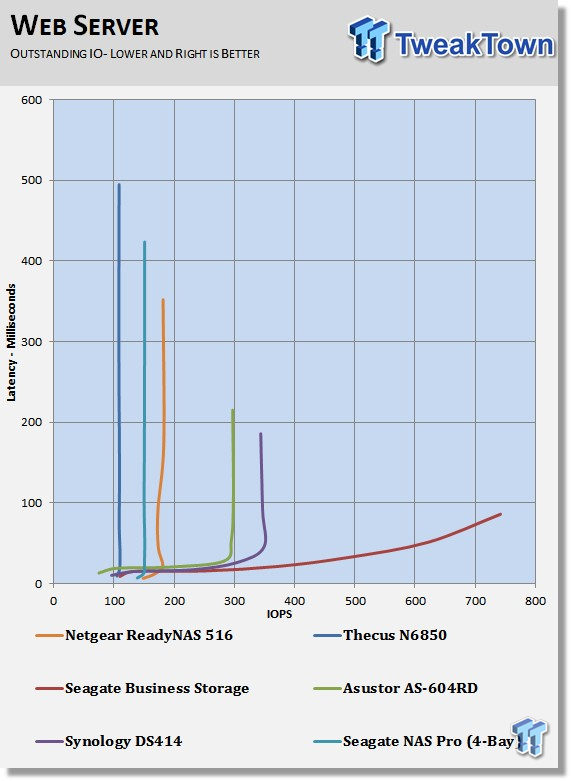
We expected the Seagate NAS Pro to perform really well in the web server test after the very impressive performance the Seagate Business NAS gave us several months ago. The NAS Pro performed reasonably well, but didn't live up to our expectations.
Power Consumption
We level the playing field in our power consumption test by using a single Seagate NAS 4TB HDD in each system during the test. This allows us to test the power consumption of the NAS, and not the amount of HDDs in it. It also allows us to test different drive count systems, and still compare the power consumption from the server, and not the drives.
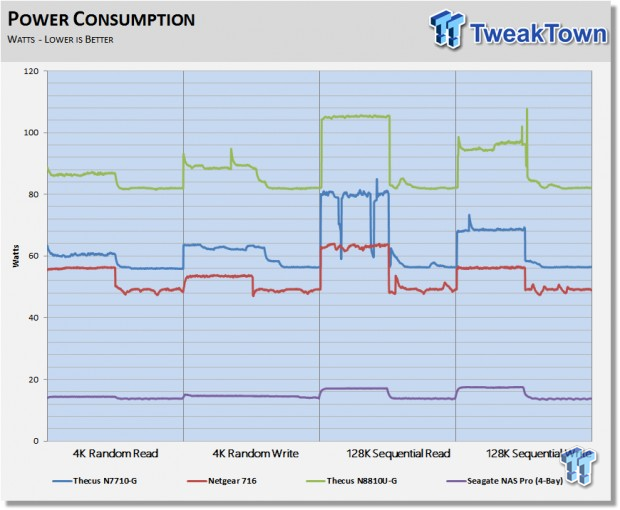
This is the first time we have run our new power test on a smaller SMB system. The NAS Pro sips power in comparison to the entry-level enterprise products that are also on the chart. This test uses just one HDD per NAS, so we can compare the system power consumption, and don't have to worry about one system holding more drives than the other, or what drives are in the NAS. The power drop off you see in each section is idle time where the test finishes, and the system has time to recover.
Benchmarks - Multi-Client Test
The Intel NAS Performance Tool (NASPT) is an excellent way to determine NAS performance in a single user environment. Any review that only uses NASPT assumes that only a single computer will access the target NAS at one time. We took issue with this method of testing, and spent over a year designing, building, programming, and finally validating the TweakTown Multi-Client Test.
The test uses Microsoft Office data recorded to traces and played back to the NAS from up to 120 client Windows 7 installations (clients). We record total throughput of all clients, and average response time per client.
Over time, we'll populate the two multi-client charts with several NAS products from a span of categories. The products range from a dual Xeon server with 2x 10GbE, to a 2-Bay NAS with a single gigabit Ethernet connection. The products will fall into their performance categories based on performance, and not marketing material or opinion.
Throughput
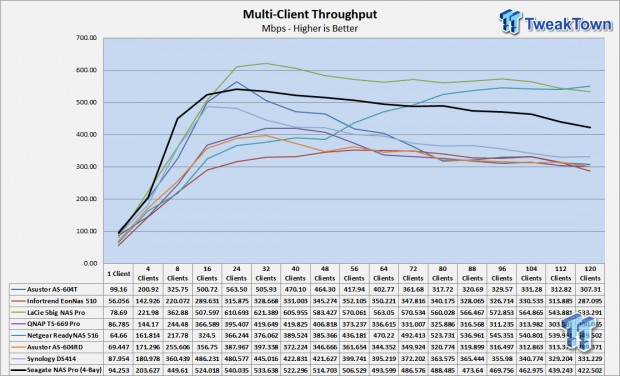
Using several clients performing automated Microsoft Office tasks, the NAS Pro performed very well. This is an important test since this is the market Seagate targets with the NAS Pro.
Latency
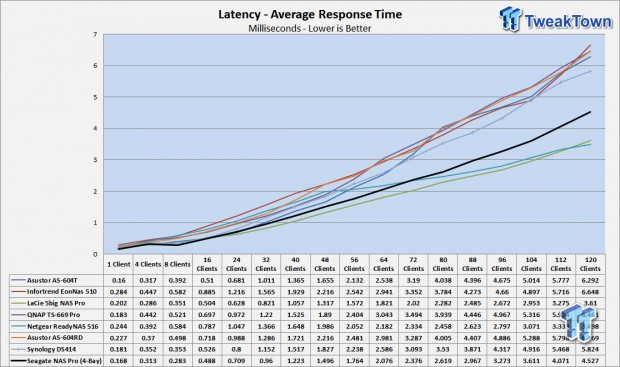
The latency results were just as impressive. The Seagate NAS Pro 4-Bay was only outperformed by the LaCie 5big Pro.
Final Thoughts
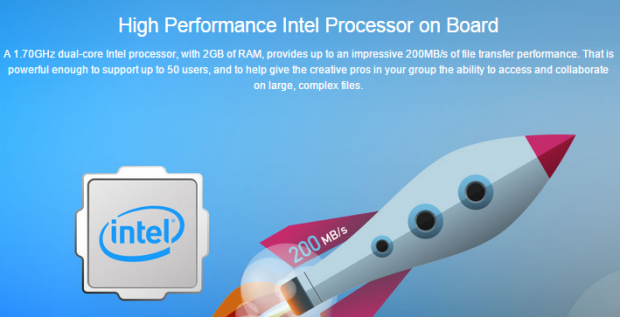
Seagate put together an attractive and powerful package for a decent sized office. The system performs very well with workers manipulating files on the NAS, but we wouldn't try to use the system for application workloads. The Atom dual-core processor running at 1.7GHz and 2 GB of system RAM proved to be a solid combination, but it quickly runs out of steam with applications.
The NAS Pro series has several options for capacity. This series ships in 2-Bay, 4-Bay, and 6-Bay models, with each base model being a diskless version. The capacity options are very broad, from 2TB to a massive 30TB with some overlap in capacity from the different drive count models.
Including Seagate's new 5TB NAS HDDs as an option is exciting. Never before has 20TB fit in such a small footprint (when using the 4-Bay model). The 6-Bay NAS Pro takes density up a notch with 5TB drives, offering a massive 30TB. That density was previously reserved for rackmount, or large pedestal systems that draw significantly more power, and take up more space.
The power consumption we recorded in our test was just as impressive. NAS products usually run 24/7, and spend most of that time in an idle state. This system draws very little power, even under full load.
Today we focused on the 4-Bay NAS Pro, and found its price point in line with other products in its class. $499.99 gets you a diskless model that you can add your own drives to. The 8TB option moves the price up to $899.99, and the 16TB model we tested today costs $1299.99. The large 20TB 4-Bay model kicks the price all the way up to $1899.99. At that price point, the 6-Bay 24TB model looks a bit better for just $100 more.
The weak point of this system comes from the software. The NAS OS is responsive and has several services, but lacks the polish found on the Synology, Thecus, and QNAP systems. This affects some environments, mainly consumers, but doesn't have a large impact on the market the NAS Pro was designed for, small offices.
PRICING: You can find the Seagate NAS Pro 4-Bay for sale below. The prices listed are valid at the time of writing, but can change at any time. Click the link to see the very latest pricing for the best deal.
United States: The NAS Pro 4-Bay (Diskless) retails for $499.99 at Amazon, the NAS Pro 4-Bay (8TB) retails for $779.52 at Amazon, the NAS Pro 4-Bay (16TB) retails for $1,299.99 at Amazon, and the NAS Pro 4-Bay (20TB) retails for $1,899.99 at Amazon.

| Performance | 92% |
| Quality including Design and Build | 93% |
| General Features | 91% |
| Bundle and Packaging | 92% |
| Value for Money | 91% |
| Overall | 92% |
The Bottom Line: In single user share and multi-client office environments, the Seagate NAS Pro performs well. Application performance over iSCSI wasn't the best, but is also outside of Seagate's target market for this product.
PRICING: You can find products similar to this one for sale below.
 United
States: Find other tech and computer products like this
over at Amazon.com
United
States: Find other tech and computer products like this
over at Amazon.com
 United
Kingdom: Find other tech and computer products like this
over at Amazon.co.uk
United
Kingdom: Find other tech and computer products like this
over at Amazon.co.uk
 Australia:
Find other tech and computer products like this over at Amazon.com.au
Australia:
Find other tech and computer products like this over at Amazon.com.au
 Canada:
Find other tech and computer products like this over at Amazon.ca
Canada:
Find other tech and computer products like this over at Amazon.ca
 Deutschland:
Finde andere Technik- und Computerprodukte wie dieses auf Amazon.de
Deutschland:
Finde andere Technik- und Computerprodukte wie dieses auf Amazon.de
Related Tags
